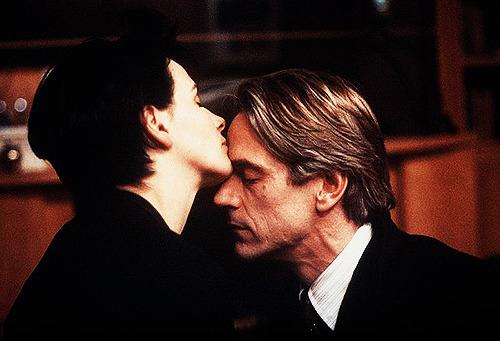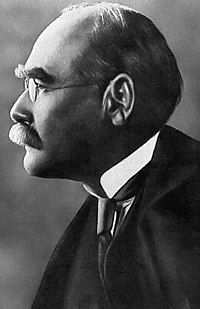Damage
 Sunday, March 16, 2008 at 10:10
Sunday, March 16, 2008 at 10:10 Love and war are old pastimes; obsession brings forth much more interesting data. Some may reply that love itself is an obsession, a maniacal urge to experience life’s greatest reward regardless of the personal cost (and as you can see, that last sentence makes as much sense as love). True enough, obsession often comprises many facets of love, but it is a selfish love, a bitter, corrosive lust that lurks in both the good and the wicked. Love is always nauséabond; obsession cannot lead to anything good. We know this and yet, as we watch this magnificent film unravel, as so many reviewers have put it, like a slow-motion car wreck, we cannot look away although (or maybe because) doom for all is veritably assured.
 There are no ugly people, scenery, or moments in Damage, as the film itself is obsessed with obsession, with caring about something so much that it slowly engulfs everything else. For an aesthetic project, this means beauty, and often what accompanies beauty – youth, lust, irreverence, irresponsibility, betrayal, and pain. Stephen Fleming (Jeremy Irons) is a rising deputy minister who will likely be promoted to the cabinet. His life has everything a plain, material mind could wish for as well as those things that most every soul needs: a loving spouse (Miranda Richardson), two well–adjusted children (Rupert Graves and Gemma Clark), and a solid marriage based on admiration, respect, and love. But he has been a responsible and driven workaholic for too many years, ever since he was a "young doctor, doing simple things well." One day, his son Martyn, a young, handsome newspaper editor, announces he has a new girlfriend, apparently nothing more than the flavor of the month. This woman is Anna Barton (Juliette Binoche), whose alphabetic name already suggests her primordial importance, and before Martyn can even introduce her to his parents, she approaches Stephen at an official reception. The look they exchange is one of the most impressive bits of understatement in recent cinematic history. It says absolutely everything about their relationship, about Anna’s mind and personality, as well as about Stephen’s hard-won position of influence and what he has had to give up to get there. Their first physical encounter is wordless, the phone call that abets their urges almost as taciturn, and we understand the weird chemical processes programmed into each of us, for many never to be truly unleashed. This is brute force, animalistic and unstoppable, but there is also much more to this than meets the eye.
There are no ugly people, scenery, or moments in Damage, as the film itself is obsessed with obsession, with caring about something so much that it slowly engulfs everything else. For an aesthetic project, this means beauty, and often what accompanies beauty – youth, lust, irreverence, irresponsibility, betrayal, and pain. Stephen Fleming (Jeremy Irons) is a rising deputy minister who will likely be promoted to the cabinet. His life has everything a plain, material mind could wish for as well as those things that most every soul needs: a loving spouse (Miranda Richardson), two well–adjusted children (Rupert Graves and Gemma Clark), and a solid marriage based on admiration, respect, and love. But he has been a responsible and driven workaholic for too many years, ever since he was a "young doctor, doing simple things well." One day, his son Martyn, a young, handsome newspaper editor, announces he has a new girlfriend, apparently nothing more than the flavor of the month. This woman is Anna Barton (Juliette Binoche), whose alphabetic name already suggests her primordial importance, and before Martyn can even introduce her to his parents, she approaches Stephen at an official reception. The look they exchange is one of the most impressive bits of understatement in recent cinematic history. It says absolutely everything about their relationship, about Anna’s mind and personality, as well as about Stephen’s hard-won position of influence and what he has had to give up to get there. Their first physical encounter is wordless, the phone call that abets their urges almost as taciturn, and we understand the weird chemical processes programmed into each of us, for many never to be truly unleashed. This is brute force, animalistic and unstoppable, but there is also much more to this than meets the eye.
For Anna, Stephen is safe. Apart from being twenty years her senior and married, he is the father of her boyfriend, so they cannot possibly have a relationship glazed with sweet nothings. He also allows her to indulge her lifelong therapeutic need of fighting possessiveness by cheating. If you don’t see this unbelievably selfish streak, and how she instigates everything then wants no responsibility for her actions because of the cruel fate of her young brother (a back story that I will not spoil), your ethical standards may need some ironing. "Damaged people are dangerous," she says with some gusto, "they know they can survive." Throughout the film, Anna thinks of herself as a tragic figure even though she has enjoyed a privileged if itinerant life, and her mother’s numerous marriages do nothing to dispel her cynicism. No less culpable but much more idealistic, Stephen is taken by her for reasons we can and cannot understand. Surely Martyn is reveling in the freedoms of youth that presumably eluded Stephen owing to his career and long marriage, and Stephen is sentimental for those times when his whole life lay before him, unread, undetermined, but very promising. The less transparent reason is his own, something that he makes light of at the end of the film, and has to do with Anna as the person he was always meant to covet, to have, and perhaps to keep. The two of them conspire on an affair that only gets more heated once Martyn and Anna announce their engagement.
Reviews of the film tend to sprinkle their compliments on the fine acting (Irons and Richardson in particular are more than perfect, they are unforgettable), beautiful decor, and straight road of destiny that each of the characters follows. Yet among these same reviews, one finds numerous concerns about the plausibility of the whole endeavor. Anna is not the type of woman that drives a man to passion or obsession say a few critics, apparently experts on both subjects; there are, others point out, additional character issues apart from the extramarital affair that remain unexplored (a valid observation were it not for the fact that the movie is about monomania and the extinction of everything else); then there are the numerous sex scenes which critics tell us, with no small disappointment, are simply not sexy; finally, since this is a film about passion, an emotion to which Stephen is famously accused of being immune, the alleged sparks between the two main characters are, they are sorry to say, decidedly cold and, well, passionless. All in all an attractive picture if a fairy tale.
How curious it is that the same reviewers who suspend their disbelief for giant extraterrestrials, ghosts, talking animals, vampires, werewolves, and sharp-witted, benevolent teenagers find the circumstances in Damage, as well as the particular casting, unlikely. True enough, there are certain assumptions made of artistic melodramas that confine them to the realm of the real and preclude supernatural or otherworldly intervention. Yet how can we judge what is, in essence, a fairy tale with modern princes and princesses living in the upper echelon of early 1990s London? This is hardly a realistic slice of life for the majority of viewers. Why should their tastes and emotions (and the strange way in which they express these emotions) be any more familiar to us than their lifestyles? They are not. Nothing seems real because the whole film is a wild dream that sees its end in its beginning and rambles forth undeterred hoping that it will survive. It is Stephen’s second youth and his death, although we pity him more than anyone else in the film. He is lost, utterly lost, utterly without a center or a pole or gravity itself. He cannot crash down to earth, and because he cannot let go of one woman who doesn't seem so different from anyone else, he is exiled to hover forever in space and watch his innermost desires from afar. And, unlike Anna, he does not know whether he can survive.




